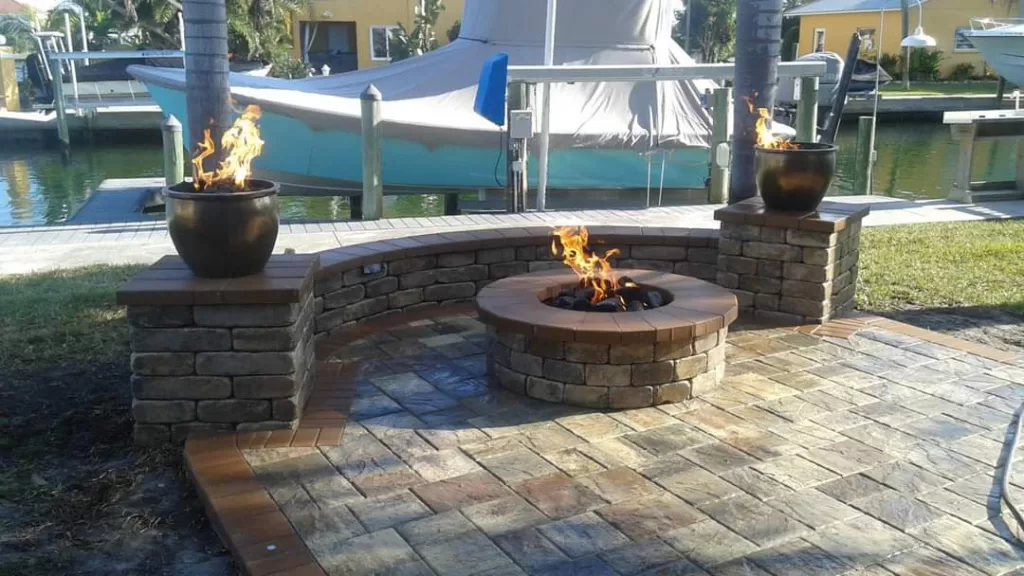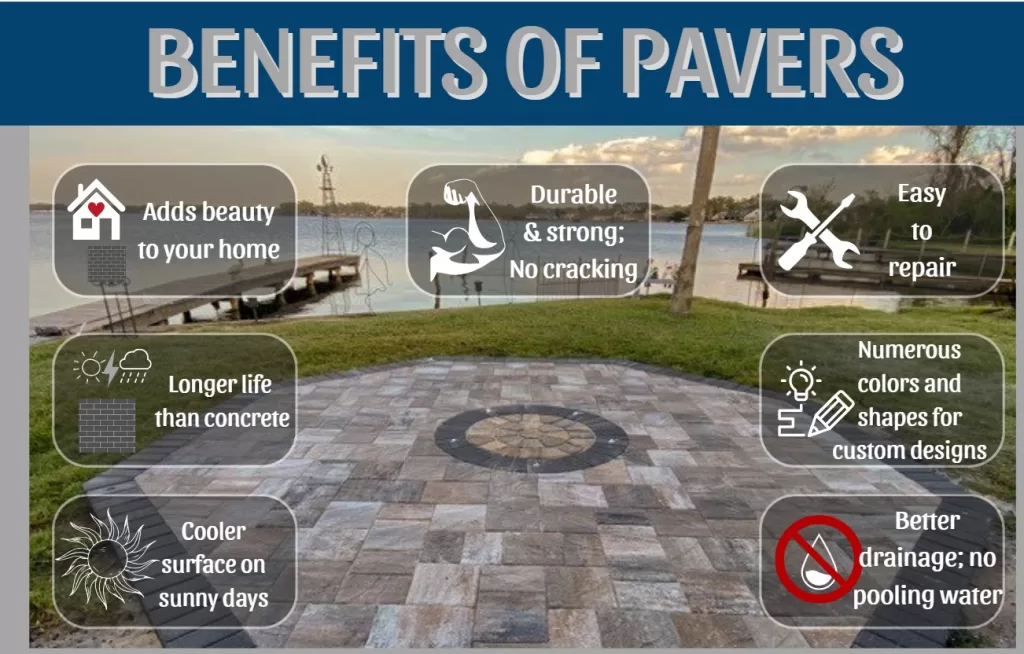Pavers vs Concrete: Benefits and Costs
When it comes to choosing a material for your patio, driveway, pool deck, or other outdoor space, you’ll likely come across two popular options: pavers vs concrete. Both have their own set of advantages and disadvantages, so it’s important to weigh your options before making a decision.

If you’re not able to fit your extended family or all of your friends in your dining room for special occasion dinners or parties, don’t worry a new patio can offer the perfect solution. Extend your usable living space with a new paver patio or pool deck and move the party outdoors where there is room to spread out. Let’s discuss the pros and cons of pavers vs concrete for your project.
Concrete: A Classic Choice with Drawbacks
Concrete is a well-known and widely used material for paving. It’s relatively affordable, readily available, and can be poured into any shape or size. However, concrete also has some drawbacks:
- Cracking: Concrete is prone to cracking, especially in areas with extreme weather conditions or shifting soil. Once cracked, concrete can be difficult and expensive to repair.
- Monotonous look: Concrete typically comes in a limited range of colors and textures, making it difficult to create a unique and stylish look.
- Heat absorption: Concrete absorbs heat, which can make it uncomfortably hot during the summer months.
- Drainage issues: Improperly installed concrete can lead to drainage problems, causing water to pool on the surface.
Pavers: A More Durable and Versatile Option
Pavers are individual units made from clay, concrete, or natural stone that are installed together to create a surface. They offer several advantages over concrete:
- Beauty: Pavers are a very attractive surface you can use for your outdoor hardscaping project. With dozens of color, style, shape and pattern options, pavers can be coordinated with your house color and border contrast to make it even more elegant to the eye.
- Variety: Pavers come in a wide variety of colors, shapes, and textures, allowing you to create a truly unique and stylish look for your outdoor space. Due to the nature of paver design and installation, every job is unique. You can choose between very basic areas, square, rectangle or even free-formed to align to the natural shape of your area.
Paver installers can even add custom accessories such as grilling stations, water features, sunbathing areas or a fire pit area with seating for roasting marshmallows and smores.
Innovative low-voltage lighting options offer both safety and functionality. They can be placed on the border of your pavers, in sitting benches or vertically on wall blocks. Built-in lights provide beautiful landscape lighting that will set your yard apart from the neighbors. - Easy Repair or Clean Ups: One of the nice things about pavers versus concrete is they are easy to repair or replace just a small area. For instance, if you spill oil on one it can be replaced versus concrete you are stuck with the oil stain forever because once penetrated you can never get it out completely.
- Drainage: Pavers allow for better drainage than concrete, as the spaces between the units allow water to seep through into the ground. Some municipalities require permeable surfaces to prevent drainage issues so this may be a consideration when planning your project.
- Cooler surface: Pavers absorb less heat than concrete, making them more comfortable to walk on during hot weather.
- Durability: Pavers are much more resistant to cracking than concrete. The individual units can shift slightly to accommodate ground movement, preventing cracks.
Stone pavers are more durable than large sections of poured concrete. With minimal continued care pavers can be around for generations. As proven by the picturesque European cobblestone streets that have endured since the Roman Empire days.
Fun Paver Fact: Rome laborers installing cobblestone roads were required to follow very strict installation guidelines. If an inspector could bury his sword more than 2” deep between two stones then the slave responsible for the work was immediately killed. Don’t worry, our staff is treated much better but they still follow very strict guidelines for paver installation.
Costs of Pavers vs Concrete
The cost difference in concrete can vary dramatically. Prices are impacted by factors such as style, color, grade of property, access, excavation vs concrete removal.
In Central Florida, a basic paver installation starts at $8-12 per square foot and concrete installation starts at $6-8 per square foot. However, keep in mind that each job is unique and there are many factors to be considered. For more details on budget impacts check out: How Much Do Pavers Cost?
Therefore it’s always best to get an estimate for both pavers and concrete.
A professional paver installer will educate you on the DDWW – Do’s, Don’ts, Why’s and Wont’s of each of your options during their initial visit.

The Brickyard is a family-owned and operated paver business serving Central and West Central Florida. We are small enough to provide personal attention to details while also handling large complicated projects with lasting results.
Our expert paver and hardscaping designers will work with you to enhance and redesign your existing grounds, or collaborate with your new construction to create extraordinary living spaces for your family or business.
As our customer, you will experience the peace of mind that comes with knowing your project will be handled with professionalism by reliable craftsmen and creative designers using only quality products.
Our reputation is our most valuable asset and our team is dedicated to creating outdoor spaces that are both attractive and functional.
